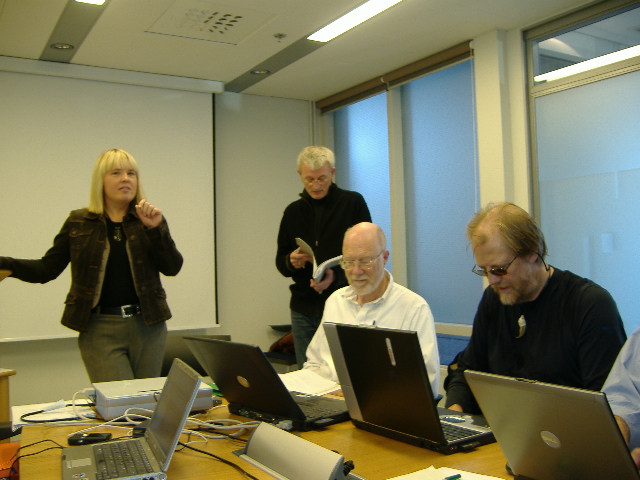My Activity with Working Groups
ASI leaders Joan Larsen and Peter Schweitzer with working group members |
In addition to the site-specific research I do in Russia and North America, I am involved in several working groups. I serve as 1) a team leader for Arctic Social Indicators Working Group, Stefansson Arctic Institute Akureyri, Iceland; 2) a steering committee member for American Anthropological Association (AAA) Climate Change Task Force; 3) a steering committee member for Managing Our Planet, George Mason University, Virginia; 4) a steering committee member for SEARCH-Understanding Arctic Change Taskforce, Arctic Research of the United States, Fairbanks, AK; 5) a steering committee member for Committee on Environmental Security, American Meteorological Society. In the past I served as: 1) a Sustainable Development and Arctic Economies working group member for the Second International Conference on Arctic Research Planning II (ICARP II), 2) a steering committee member for the Northern Research Forum (NRF). |
Arctic Social Indicators (ASI) Working Group, Stefansson Arctic Institute Akureyri, Iceland: The ASI project is a follow-up on the Arctic Human Development Report (Click HERE for the AHDR) and led by Joan Nymand Larsen, Stefansson Arctic Institute, and Peter Schweitzer, University of Alaska Fairbanks. The objective is to devise a set of social indicators that reflect key aspects of human development in the Arctic, that are tractable in terms of measurement, and that can be monitored over time at a reasonable cost in terms of labour and material resources. In 2006 a circumpolar working group was established, with our first meeting in Akureyri, Iceland, on September 15-17, 2006, involving approximately 25 participants. Since that time, we have generated our first publication and are working on ASI-2. American Anthropological Association (AAA) Climate Change Task Force, Steering Committee: The formation of the AAA Task Force on Global Climate Change is a step toward bringing anthropology’s multiscalar contributions into the spotlight and increase its engagement with research, policy discourse, and the communities with which we work. The Task Force’s charge is broad:
|
|
Managing Our Planet, The series hopes to illuminate the environmental challenges of climate change, ecosystem change, energy demands and demographic trends, among others. Leaders from George Mason University, on Earth Day 2010, identified a need for a public forum of science-anchored discussions on planetary management. The Environmental Change and Security Program at the Woodrow Wilson Center joined this effort to explore the science/policy interface of planetary management. The program will be developed jointly by Mason and the Woodrow Wilson Center and will actively foster discussion with academics, managers, policymakers and other interested sectors.
SEARCH-Understanding Arctic Change Taskforce: The Understanding Arctic Change Task Force will lead community activities to establish a long-term vision and provide the scientific framework for a modern effort for understanding the arctic system. This effort will outline an approach that facilitates a broad array of activities—from individual proposals, to synthetic workshops, to comprehensive research programs—to better address current scientific challenges in a rapidly changing arctic system. This group (see box below for members), with input and review from the broader community, will identify needs for accelerated community capacity-building and understanding of the rapidly changing arctic system. The task force will have a term of one year. The central product of the task force will be a community white paper to: identify key scientific unknowns and obstacles to advances in understanding arctic system change; and identify the next steps in synthesis activities, methodologies, mechanisms, and approaches to address the identified key science questions.
Committee on Environmental Security: The purpose of the American Meteorological Society (AMS) Committee on Security (SEC) is to promote awareness of the increasing importance of security impacts of weather and climate events. Created as a committee under the AMS Commission on the Weather and Climate Enterprise (WCE), the SEC, in conjunction with the WCE and AMS staff, will provide appropriate venues to engage the membership on important topics related to the intersection of weather, climate and security, and to assist in developing recommendations as to the AMS’ role in information for decision-makers.
Details on my Past Working Groups:
The main goals of ICARP II were 1) to prepare Arctic research plans to guide international cooperation over the next 10-15 years; and 2) to bring together senior and young scholars, policy experts, Arctic indigenous and other residents, science and land managers as well as funding agencies. The conference took place in Copenhagen, Denmark, 10-12 November 2005. The comprehensive pre-conference process engaged over 140 scientists in the preparation of 12 science plans. The International Arctic Science Committee (IASC) is the main patron of ICARP II.
For general info: http://aosb.arcticportal.org/icarp_ii/index.html
For our WG report: http://aosb.arcticportal.org/icarp_ii/science_plans/Science%20Plan%2001%20_%20%20ICARP%20II.pdf
The Northern Research Forum (NRF) provides a platform for policy-relevant discussion and the sharing of research on northern issues. Meetings are held biennially with the participation of a wide variety of scientists, policy makers and representatives of other stakeholders. Read more on the NRF mission and activities here. The first NRF was held in Akureyri, Iceland in November 2000, the second in Veliky Novgorod, NW Russia in September 2002 and the third in Yellowknife, Northwest Territories in Canada in September 2004. The fourth Open Meeting was in Oulu, Tornio, Haparanda and Luleå in Sweden and Finland, October 2006. Anchorage, Alaska in 2008, Hveragerði, Iceland in 2011. For more info: http://www.nrf.is/
